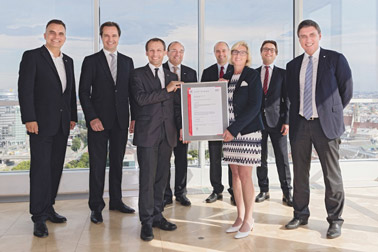Quality and risk management
Comprehensive risk management system
Vienna Insurance Group uses effective risk management that allows risks to be handled professionally. This is very important for the Company, because its activities as an insurance group expose VIG to a large number of risks. These include traditional underwriting risks (incl. natural disaster risks), risks due to investments and a number of other risks, such as operational risk and reputation risk. Operational risk is the risk of losses related to business operations, such as expertise concentration risk, personnel shortage risk, legal and compliance risk, IT software and security risk and process and organisational risk. Reputation risk is the risk of negative changes in the business due to damage to a company’s reputation. Reputation damage can shake customer confidence and the confidence of investors and the company’s own personnel. Such damage can be caused, among other things, by providing incorrect advice when selling products, poor customer service, incorrect information to investors, etc.
Professional handling of risks due to effective risk management
VIG uses a comprehensive risk management system to fully identify, assess, manage and monitor the risks mentioned above and many other risks to which the Company is exposed. The risk management organisation is firmly anchored in the management culture of the Company and is based on a clearly defined risk policy and extensive risk expertise. Further information on VIG risk management is provided in the notes to the consolidated financial statements starting on page 144.
VIG awarded TÜV quality management certification

Chairwoman Ms. Stadler accepts the award
© Sebastian Philipp
VIG focuses on quality, risk minimisation and the efficiency and effectiveness of processes and workflows. This has now also been officially confirmed – the process department responsible for these matters has been awarded TÜV quality certification in accordance with EN ISO 9001:2015. Achieving this quality standard is still something quite new in the Austrian insurance industry. Certification was awarded after a nine-month startup phase.
ISO 9001 is a clearly recognised, globally established standard for top quality management. The new ISO 9001:2015 certification has been in effect since the autumn of 2015 and places greater weight on the strategic orientation of an organisation, among other things. In addition to considering process orientation, the way that risks and opportunities are handled is also part of the evaluation.
